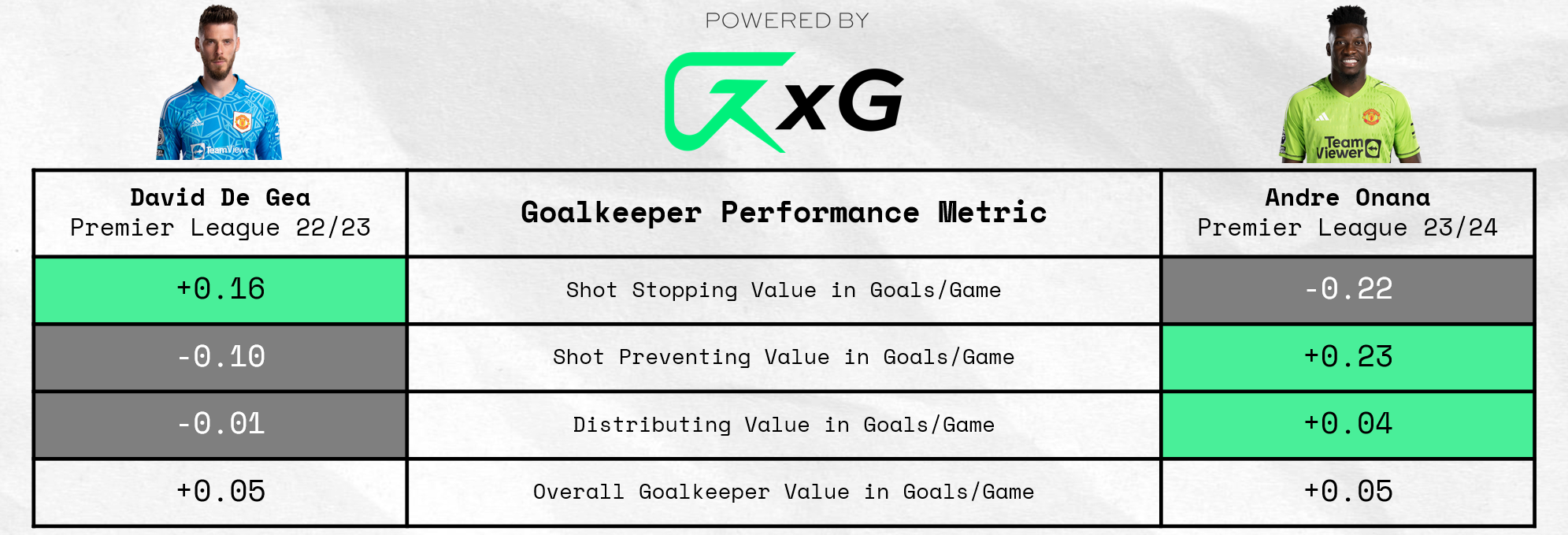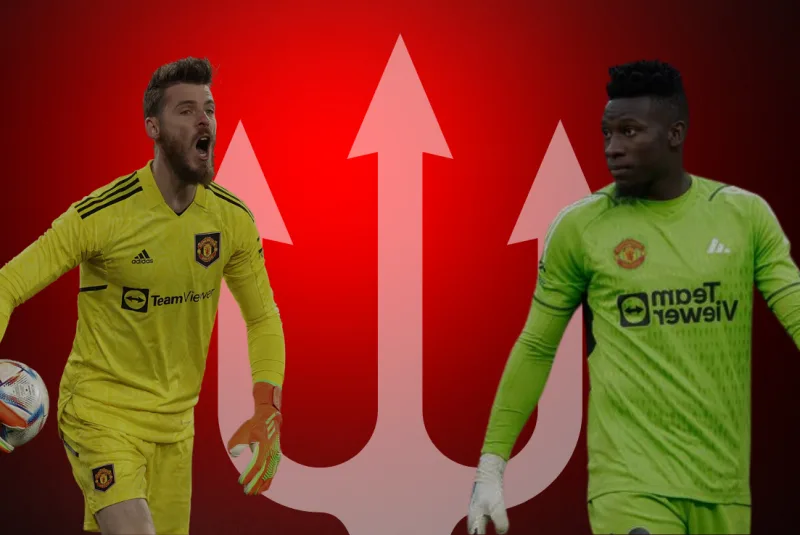It was the summer's biggest goalkeeper deal, but has Andre Onana performed head and shoulders above De Gea so far?
Manchester United have had a stuttering start to the 2023/2024 Premier League season.
A hard fought 1-0 victory against Wolves was followed by a comprehensive 2-0 defeat against Tottenham. Despite a valiant 3-2 comeback win vs Nottingham Forest, the momentum was sapped out of the team by a last gasp 3-1 defeat to Arsenal. Many in the media have started to point fingers at Manchester United's poor defensive record for this indifferent start, and therefore Andre Onana’s performances (who Manchester United signed for £47 million in the summer) have been under the spotlight.
But what do the numbers say about the Cameroon international's role in Manchester United’s average start to the season?
Last year, Manchester United finished third in the Premier League after gaining 1.97 points per game, conceding 1.13 goals per game (the third best in the league behind Newcastle and Manchester City) and keeping 0.45 clean sheets per game (the best record in the league).
At the start of this season all of these numbers have dropped off. Manchester United have gained just 1.50 points per game (on track for a seventh place finish), conceded 1.75 goals per game (13th in the league), and have kept just one clean sheet. Some outlets have used these statistics to analyse Onana's performance, incorrectly.

Naively one may assume that the above numbers therefore highlight that United's problems are down to their new stopper, but crucially these three metrics are all heavily dependent on team performance. Clean sheets and goals conceded in the Premier League are strongly correlated to shots on target faced which is a metric which is largely out of a goalkeeper's control.
Therefore, using goals conceded per game and clean sheets per game to evaluate goalkeeping performance is inherently flawed as those metrics mainly measure team defensive performance rather than goalkeeper performance.
In order to fairly evaluate the performance of Onana, we can use Goalkeeper xG’s bespoke xG metrics. These metrics analyse every single action a goalkeeper does, and could do, on the football field. By calculating the probability of a goal occurring for and against the goalkeeper's team before and after every action can evaluate the quality of everything a goalkeeper does.
The metrics effectively help us definitively answer questions like 'should the goalkeeper have saved that?', ‘should the goalkeeper have caught that?', and ‘should the goalkeeper have come off their line then?’.

Interestingly, Onana has performed at exactly the same level thus far as De Gea did last season. Both goalkeepers were, and have been, worth 0.05 goals above the Premier League average level per game to Manchester United. So, while Onana has certainly not gone above and beyond expectations, to say he has made Manchester United worse is definitely not true.
As one may imagine, the way in which Onana has contributed positively to Manchester United so far is not the same as the way De Gea contributed positively to Manchester United last year.
While De Gea’s shot stopping was not at his usual best last year he still saved around six goals more than an average Premier League goalkeeper would be expected to, given the individual properties of the shots he faced, and was worth around +0.16 goals per game to Manchester United. But as most Manchester United fans know, poor shot stopping was not the reason Manchester United moved David De Gea on at the end of last year.
His shot preventing and distributing performances were both below the Premier League average level. His lack of proactivity off his line meant Manchester United conceded around 0.10 xG worth of additional chances per game and his below average ability on the ball meant Manchester United failed to build up an additional 0.01 xG worth of chances per game.
Thus, when accounting for every possible on field action, De Gea’s worth to Manchester United was just 0.05 xG per game.
On the other hand, Onana thus far has achieved a positive score of 0.05 xG per game in an almost antithetical fashion. His shot stopping has been below average, as Goalkeeper xG’s model would expect an average Premier League shot stopper to have made 18 saves so far whereas Onana has made 17. This is mainly driven by the weak Martinez own goal, the Rice deflected goal against Arsenal, and the Awoniyi goal against Nottingham Forest which had save probabilities of 59.9%, 41.4%, and 58.2% respectively.
However, his shot prevention and distribution have both been excellent. His proactivity off his line has meant Manchester United have conceded around 0.23 xG less per game than if he was replaced with a league average goalkeeper and his comfort on the ball has meant that Manchester United have been able to build up an additional 0.04 xG worth of chances per game.
Onana's excellent shot prevention number has mainly been driven by his cross claiming. He has claimed seven crosses when, given the properties of the individual crosses, an average Premier League goalkeeper would only have been expected to claim 4.3.
It's true that Manchester United have started slowly mainly due to a drop off in their defensive performance. However this is not down to their goalkeeper performing at a lower level. Onana and De Gea were both performing at a slightly above average level but doing so in opposite ways.
De Gea’s poor shot prevention and distribution dragged his quality shot stopping down while Onana’s quality shot prevention and distribution have been held back by his below average shot stopping. Manchester United will obviously want to see an improvement in terms of shot stopping from their new number one and therefore a much larger goal value overall, but to say after just four games that Onana has held Manchester United back is ludicrous.
Only time will tell if the trend continues and Onana’s shot stopping becomes an issue for Manchester United but at the moment the data suggests he is doing no worse than the man he replaced.








